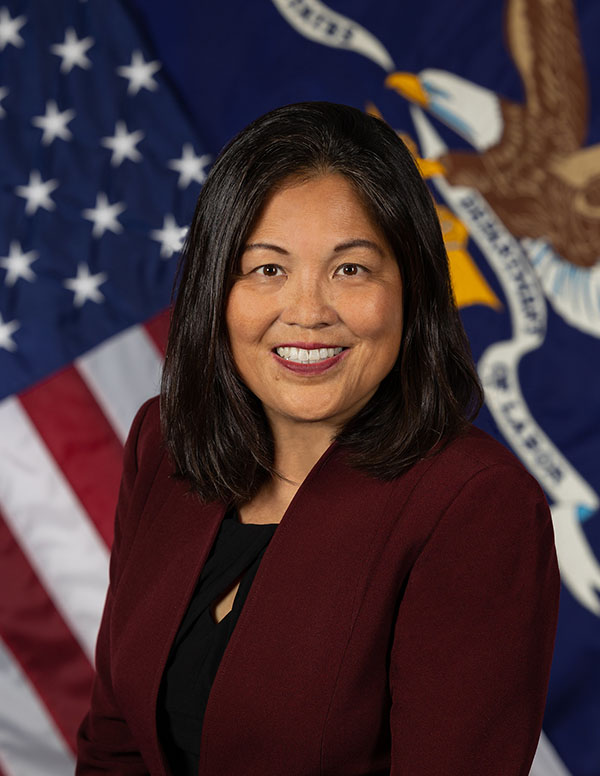
This Q&A has been edited for clarity and brevity below.
Native News Online: There were 353K jobs added in January, with unemployment at 3.7%. What do you attribute this robust report to?
Acting Secretary Su: This job report crushed expectations. The job growth and unemployment rate held steady for two years straight. Labor force participation rate was also steady and ticked up slightly for prime age workers.
We’re also seeing the lowest gaps between the average unemployment rate and that for different communities of color. And this is all just a follow-up sign that Bidenomics, which is what we call the President’s agenda, is to invest in America to prioritize working people and to make sure that everybody gets to share in economic growth.
Native News Online: Given that, we know the unemployment rate tends to trend higher among American Indians and Alaska Natives. What is the Biden/Harris Administration doing to close the gap?
Acting Secretary Su: We are all in on making sure that what we say no one gets left behind, including our Indigenous sisters and brothers.
We had the White House Tribal Nations Summit, hosted by Interior Secretary Deb Haaland, recently here in Washington, D.C,. which I attended, as did many of my cabinet colleagues,
Being there just really confirms what we already know, which is that we have to do more work to make sure that the American Indian and Alaskan Natives are included in the economic recovery to add to their prosperity.
In some places, there are some unique challenges. There’s the challenge that there just haven’t been enough jobs. There haven’t been enough jobs created that are available to some tribal communities. They’re too far away from where jobs are. In some cases, we haven’t invested in the infrastructure of things like transportation that will get people to and from jobs and job training programs. So that’s all much of the work that we’re doing.
One of the things that I know that you know is that we also can’t know what we need to do, or what the barriers and challenges are if we’re not clear on the data.
When President Biden talks about physical roads and bridges. I know that that’s something that matters greatly. I think about our workforce system as roads and bridges. We have to make sure we’re connecting people to good jobs and employers to people, and that includes Native communities, and those roads and bridges to those communities have been too weak for too long. They’ve been riddled with potholes.
And so we’re very invested in creating workforce training programs that are accessible to all communities, and they’re intentional about recruiting, you know, how to reach into all communities. We want to increase funding for technical assistance to make sure they are reaching all who need them.
Native News Online: The Biden-Harris administration has stepped up tribal consultation across federal agencies.Tell us what the Labor Department is doing.
Acting Secretary Su: We have our own internal internal statement about it. We have our own internal training, to make sure that staff knows our approach to tribal consultation. It’s one thing to say it, it’s another thing to do it, and we are our own internal training, so that all staff who interact with you and as a community know what we’re about.
More Stories Like This
Native News Weekly (August 25, 2024): D.C. BriefsUS Presidents in Their Own Words Concerning American Indians
Indigenous Actor Elaine Miles Reports Detention by Alleged ICE Agents
Happy Thanksgiving from Native News Online
Coming Up on Native Bidaské: Behind the Animation: Joey Clift Talks “Pow” and Native Storytelling
Help us tell the stories that could save Native languages and food traditions
At a critical moment for Indian Country, Native News Online is embarking on our most ambitious reporting project yet: "Cultivating Culture," a three-year investigation into two forces shaping Native community survival—food sovereignty and language revitalization.
The devastating impact of COVID-19 accelerated the loss of Native elders and with them, irreplaceable cultural knowledge. Yet across tribal communities, innovative leaders are fighting back, reclaiming traditional food systems and breathing new life into Native languages. These aren't just cultural preservation efforts—they're powerful pathways to community health, healing, and resilience.
Our dedicated reporting team will spend three years documenting these stories through on-the-ground reporting in 18 tribal communities, producing over 200 in-depth stories, 18 podcast episodes, and multimedia content that amplifies Indigenous voices. We'll show policymakers, funders, and allies how cultural restoration directly impacts physical and mental wellness while celebrating successful models of sovereignty and self-determination.
This isn't corporate media parachuting into Indian Country for a quick story. This is sustained, relationship-based journalism by Native reporters who understand these communities. It's "Warrior Journalism"—fearless reporting that serves the 5.5 million readers who depend on us for news that mainstream media often ignores.
We need your help right now. While we've secured partial funding, we're still $450,000 short of our three-year budget. Our immediate goal is $25,000 this month to keep this critical work moving forward—funding reporter salaries, travel to remote communities, photography, and the deep reporting these stories deserve.
Every dollar directly supports Indigenous journalists telling Indigenous stories. Whether it's $5 or $50, your contribution ensures these vital narratives of resilience, innovation, and hope don't disappear into silence.
 The stakes couldn't be higher. Native languages are being lost at an alarming rate. Food insecurity plagues many tribal communities. But solutions are emerging, and these stories need to be told.
The stakes couldn't be higher. Native languages are being lost at an alarming rate. Food insecurity plagues many tribal communities. But solutions are emerging, and these stories need to be told.
Support independent Native journalism. Fund the stories that matter.
Levi Rickert (Potawatomi), Editor & Publisher

